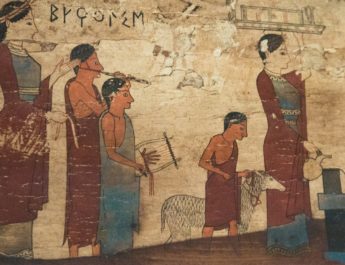Song of Songs 2:10-13 & 8:6-7
Narrative Lectionary
2:10 My belovedA speaksB and says to me:
“Arise,C my love,D my fair one,E
A “beloved” = dod. This may come from a word that means to boil. It is love or lover. It can also refer to one who is beloved, like an uncle, or a love-token.
B “speaks” = anah. This is answer, respond, announce, sing, shout, or testify. It means to pay attention, which implies responding and, by extension, starting to talk. Used in a specific sense for singing, shouting, testifying, etc.
C “arise” = qum. To arise, stand, accomplish, establish, abide. This is rising as in rising against, getting up after being sick or asleep, arising from one state to another, becoming powerful, or rising for action. It can also be standing in a figurative sense.
D “love” = rayah. 10x in OT– 9x in Song of Songs. From raah (to associate with). This is a companion, a love.
E “fair one” = yapheh. From yaphah (to be beautiful, decorate; root means being bright, which implies being beautiful). This is beautiful in a literal or figurative sense – appropriate, handsome, godly, pleasant.
and come away,F
11 for nowG the winterH is past,I
F “come away” = halak. This is go, come, walk. It is walk literally and figuratively and includes people and animals. It can be used figuratively for one’s moral life – how we walk according to God’s way or against it. It can also refer to the walk of life as in the course one’s life takes, the choices we make, etc.
G “now” = hinneh. From hen (lo! Behold! If, though; an expression of surprise). This is to draw attention, show suddenness or surprise, or to emphasize the importance of the coming statement. See! Lo! Behold!
H “winter” = sethav. 1x in OT. Of foreign origin – root may mean to hide. It is winter as a time of year that is dark.
I “is past” = abar. This is to pass over or cross over. It is used for transitions, whether literal or figurative. It can also mean to escape, alienate, or fail. This is the root verb from which “Hebrew” is drawn.
the rainJ is overK and gone.L
12 The flowersM appearN on the earth;O
J “rain” = geshem. Perhaps from gasham (to rain). This is rain, shower, or rainy. It can be used figuratively for blessing or for destruction.
K “is over” = chalaph. This is to slide by or rush like a flood. It can mean to pass through, change, sprout, renew, break a promise, pierce, or violate.
L “gone” = halak. Same as “come away” in v2:10. See note F above.
M “flowers” = nitstsan. 1x in OT. From nets (a blossom – as something that shines; a hawk – as one that flashes with its velocity); from natsats (to sparkle, shine, glare, have a bright color). This is a blossom or flower.
N “appear” = raah. This is to see in a literal or figurative sense so stare, advise, think, view.
O “earth” = erets. Root may mean to be firm. This is earth, ground, field land, or country.
the timeP of singingQ has come,R
P “time” = eth. Related to “speaks” in v2:10. Probably from anah (see note B above); from ad (forever, all, old); from adah (to pass on, advance, decorate oneself). This is a period or season. It can also mean whenever or continually.
Q “singing” = zamir. 7x in OT. From zamar (making music; used specially of music to worship God; music with singing, singing praise, singing psalms); may be from zamar (to trim or prune). This is a song, psalm, or other music accompanied with instruments.
R “come” = naga. This is touch, reach, arrive, come near, strike. This is touching for any reason including sexual or violent.
and the voiceS of the turtledoveT
is heardU in our land.V
S “voice” = qol. This is a sound, used often for human voices. Also used when God speaks or angels, animals or instruments. It can be a cry or a noise, thunder or earthquakes and so on.
T “turtledove” = tor. 14x in OT. This is a literal dove – it can also be a romantic term of affection.
U “heard” = shama. This is to hear, call, consent, or consider. It implies listening intelligently, giving attention, and, because of these two factors, obedience and action are often implied.
V “land” = erets. Same as “earth” in v2:12. See note O above.
13 The fig treeW puts forthX its figs,Y
and the vinesZ are in blossom;AA
W “fig tree” = teenah. Perhaps a foreign word. This is fig tree.
X “puts forth” = chanat. 5x in OT– 4x in Genesis 50 & 1x in Song of Songs 2:13 to refer to blooming. This is to add spices or to blossom. By implication, it can refer to getting a body ready to be burial, embalming.
Y “figs” = paggah. 1x in OT. May come from a word that means to be crude. This is a fig that blooms early in the season – a green fig that is not ripe.
Z “vines” = gephen. Root may mean to twine or bend. So, it is a vine, particularly referring to grapes.
AA “blossom” = semadar. 3x in OT. This is a blossom from a grapevine or a tender grape.
they giveBB forth fragrance.CC
Arise,DD my love, my fair one,
and come away.EE
BB “give” = natan. This is to give, put, set, offer. It is to give literally or figuratively.
CC “fragrance” = reyach. From ruach (to blow, breath; smell, anticipate; figuratively, to perceive, understand). This is a scent or breath – a savor, ointment. It is also used for the odor of sacrifices that pleases God.
DD {untranslated} = halak. Same as “come away” in v2:10. See note F above.
EE “come away” = halak. Same as “come away” in v2:10. See note F above.
8:6 SetFF me as a sealGG upon your heart,HH
as a seal upon your arm,II
FF “set” = sim. This is to put or place in a literal or figurative sense. It can be appoint, care, change, make, and may other things.
GG “seal” = chotham. 14x in OT. From chatham (to seal, close up, shut, stop, bring to an end; used especially for affixing a seal). This is a seal or signet ring.
HH “heart” = leb. May be related to labab (to encourage; properly, to be encased as with fat; used in a good sense, this means to transport someone with love; used in a bad sense, it can mean to dull one’s senses). This is the heart, courage, one’s inner self, the mind, or the will. Heart is only used in a figurative sense in the Old and New Testaments.
II “arm” = zeroa. Perhaps from zara (to sow, scatter seed, conceive). This is the arm, shoulder, or foreleg of an animal. It is figuratively used for power, force, might, or help.
for loveJJ is strongKK as death,LL
JJ “love” = ahabah. From ahab (love or affection); from aheb (to love, beloved, friend; to have affection for sexually or otherwise). This is love as a noun.
KK “strong” = az. From azaz (to be strong, become fixed, be bold, prevail, be impudent; it means to be stout literally or figuratively; a Late Hebrew word). This is strong or mighty. It can also refer to power or vehemence or mean greedy.
LL “death” = mavet. From muth (to die in a literal or figurative sense). This can be death, deadliness, the dead, or the place where the dead go. It can be used figuratively for pestilence or ruin.
passionMM fierceNN as the grave.OO
Its flashesPP are flashes of fire,QQ
a raging flame.RR
MM “passion” = qinah. Perhaps from qana (to be jealous, zealous, envious). This is zeal, jealousy, envy, anger, passion rivalry.
NN “fierce” = qasheh. From qashah (to be fierce, cruel, dense, tough, severe). This is hard, severe, heavy, obstinate, hard-hearted.
OO “grave” = sheol. Perhaps from sha’al (to ask, request). This is the place where the dead go, the grace, the underworld.
PP “flashes” = resheph. 7x in OT. Perhaps from saraph (to burn or kindle). This is a flame, thunderbolt, spark, arrow, fever, plague. Earliest sense was of a burning coal and all other senses derive from that by analogy.
QQ “fire” = esh. This is fire, burning, flaming, hot. It is fire in a literal or figurative sense.
RR “raging flame” = shalhebeth. 3x in OT. From the same as lahab (flame, flashing, bright; figuratively, a blade or the point of a spear). This is a flame, flashing, flare from a fire.
7 ManySS watersTT cannotUU quenchVV love,WW
SS “many” = rab. From rabab (increasing in any aspect whether quantity, authority, size, quality, greatness, etc.). This is abundance, many, elder, exceedingly, great. It refers to abundance of amount, rank, or status.
TT “waters” = mayim. This is water, waters, or waterway in a general sense. Figuratively, it can also mean juice, urine, or semen.
UU “cannot” = lo + yakol. Yakol is to be able, endure, overcome, prevail.
VV “quench” = kabah. This is to quench or extinguish. It could refer to a fire or to anger.
WW “love” = ahabah. Same as “love” in v8:6. See note 8:6. See note JJ above.
neither can floodsXX drownYY it.
If oneZZ offeredAAA for loveBBB
XX “floods” = nahar. From nahar (to flow, sparkle, be cheerful). This is a stream, river, or flood. Particularly used for the Nile or Euphrates. Figuratively, this can mean prosperity.
YY “drown” = shataph. This is to overflow, rinse, overwhelm, run, drown, rush, flood, cleanse, gallop, conquer.
ZZ “one” = ish. Perhaps from enosh (human, humankind, mortal); from anash (to be weak, sick, or frail). This is man, husband, another, or humankind.
AAA “offered” = natan. Same as “give” in v2:13. See note BB above.
BBB “love” = ahabah. Same as “love” in v8:6. See note 8:6. See note JJ above.
allCCC the wealthDDD of one’s house,EEE
it would be utterly scorned.FFF
CCC “all” = kol. From kalal (to complete). This is all or every.
DDD “wealth” = hon. From hun (to be easy, be ready, act light). This is wealth, possession, enough.
EEE “house” = bayit. Probably from banah (to build, make, set up, obtain children; to build literally or figuratively). This is house, court, family, palace, temple.
FFF “utterly scorned” = buz + buz. The word is repeated twice – the first time as an Infinitive Absolute. The Infinitive Absolute serves to emphasize the sentiment of the word. It is rather like Foghorn Leghorn’s speech pattern, “I said, I said.” 11x in OT– 8x in Proverbs & 3x in Song of Songs. This is to despise, belittle, scorn, disrespect.
Image credit: “Song of Songs-Last” by Aharon April, 2005.




